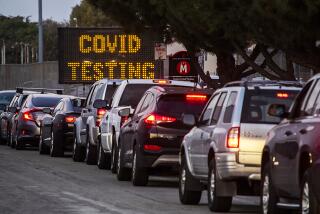President Cites Flu Epidemic Risk, Suggests Role for Troops
WASHINGTON — President Bush expressed concern Tuesday about the threat of a global flu epidemic and said Congress should consider letting the U.S. military play a broader role in enforcing quarantines and other emergency measures.
Bush said the possibility of a virulent new strain of avian influenza spreading rapidly around the world raised difficult questions about a president’s ability to direct an effective domestic response and the federal government’s authority to carry it out.
Flu pandemics have tended to occur about three times a century, after the emergence of viruses to which humans have developed no immunity.
The last such outbreak was in 1968. The deadliest was the 1918 pandemic that killed as many as 50 million people worldwide and an estimated 675,000 in the United States.
“I’m not predicting an outbreak,” Bush said. “I’m just suggesting to you that we’d better be thinking about it. And we are.... We’re trying to put some plans in place.”
World health authorities have become increasingly alarmed by the pandemic potential of a lethal strain of avian flu called H5N1, which has killed millions of birds and about 60 people who came into contact with them since it was detected in Asia in 1997. Scientists have cited initial signs that the virus might be mutating into a form that could spread rapidly from human to human and possibly trigger a pandemic.
Bush said his concern was heightened when he recently read “The Great Influenza” by John M. Barry, who described the devastation wrought in 1918 and mistakes made by public authorities in this country that worsened its toll.
Asked about avian flu during a White House news conference, Bush said the risk of an outbreak was great enough to justify a more aggressive preparedness campaign.
Part of the planning should focus on the federal government’s authority to take any steps needed to contain a flu contagion, including local or regional quarantines, Bush said.
Bush said one option would be deploying the military to provide the rapid command and control measures required to deal with a pandemic. He asked Congress to consider producing legislation to expand the federal role.
Doing so would require changing laws that restrict the role of active-duty troops in domestic emergencies, a possibility raised by the government’s problematic responses to hurricanes Katrina and Rita.
Some military officials have expressed skepticism about assuming more responsibility in such situations, and some lawmakers have voiced concern about the diminished authority of state officials and the National Guard units they control.
Health and Human Services Secretary Mike Leavitt, who is directing the administration’s preparedness efforts, said his agency was about to release the final version of the government’s first comprehensive pandemic response plan.
It is not certain at this point whether the H5N1 virus would trigger a worldwide contagion, Leavitt said in an interview. But there is little question that at some time a global influenza outbreak will occur, he said.
“There will be another pandemic,” Leavitt said. “I view it to be the most important health preparedness issue we are dealing with currently.”
The federal plan outlines steps that officials would take to detect an outbreak, administer antiviral medicines to reduce its severity, then develop, manufacture and distribute a vaccine that is effective against the virus and could stop it in its tracks.
One factor that could limit the scope of the federal response is the lack of domestic vaccine manufacturing capacity, a problem that was underscored by last year’s shortage of flu vaccine.
“What we’re dealing with here is the need to rekindle an entire industry,” Leavitt said.
Last week, the Senate voted to appropriate $3.9 billion to finance an expanded pandemic preparedness initiative. The Health and Human Services Department is expected to submit a detailed funding request when it releases its action plan.
More to Read
Sign up for Essential California
The most important California stories and recommendations in your inbox every morning.
You may occasionally receive promotional content from the Los Angeles Times.










